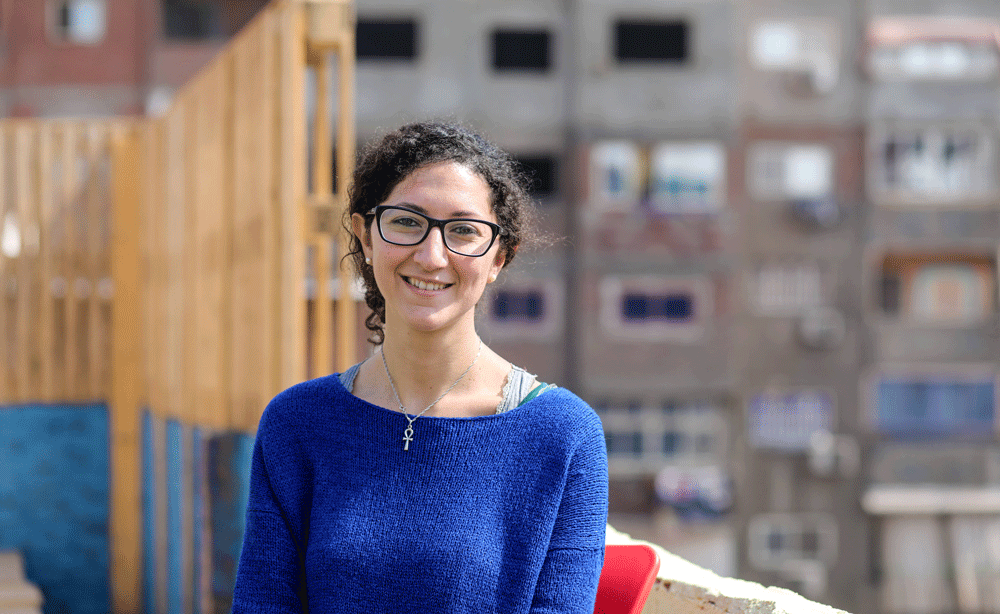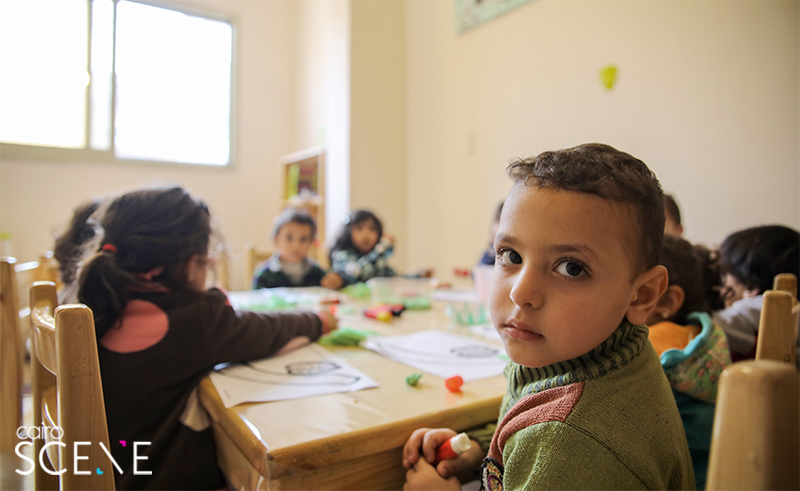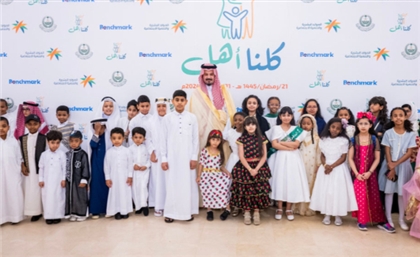The Egyptian Woman Reshaping the Lives of Cairo’s Child Garbage Collectors
In Cairo’s Garbage City, children as young as 7 sort rubbish with their bare hands to help their families subsist. Moved by their stories and aiming to make a difference, Rose-Marie El Gohary left her corporate job to create a kindergarten, where kids can feel accepted and learn life skills.

“It hit me the second time I visited Garbage City. I had forgotten - or perhaps I was pretending to forget what I had seen,” says Rose-Marie El Gohary as we speak from a terrace overlooking the frenzied streets of Cairo’s Hayy El Zabballeen. Below the six-story floor, the squeal of pigs eating from puddles of darkened garbage rises, and the stifling stench of decaying fruit, exacerbated by the city’s dust-ridden heat, pervades the air. The neighbourhood, located at the foot of the Mokattam hill, is home to about 30,000 garbage collectors, known as Zabballeen, who sort some of the 15,000 tons of garbage Cairo produces with their bare hands.
As we enter the alley that leads to the Oasis, a school set up by non-profit organisation Life Vision for Development, a woman is sitting on the floor surrounded by open sacks of garbage, her hands buried in the bags as she sorts different materials from rubbish along with other counterparts. Many of them are kids.
“I felt responsible for what’s happening to other people and I didn’t want to be an accomplice to this crime of poverty anymore,” El Gohary continues. “One day, I decided it was time to do something about it,” she says, recalling the moment she quit her corporate job to create and manage the Oasis, a kindergarten where about 300 children get a chance to learn things that many have the luxury to acquire by default: life skills.



“The problem is not just poverty; it’s their mentality. Their poverty doesn’t give them the opportunity to develop themselves. It’s as if they had stopped at a certain level of maturity and that’s it; you will not perceive any difference dealing with a kid or a grown-up,” El Gohary explains, as a faraway sound of chicken interrupts her.
Downstairs, below this colourful terrace where children playfully run, a small lorry erratically struggles to keep balance, buried under implausible loads of rubbish bags piling up over one another, while another truck comes from the opposite side defying the one-track, garbage-laden alley. There doesn’t seem to be much room in this district, where empty buildings are filled with sacks of garbage and courtyards are populated by pigs to eat the organic waste. According to a 2009 research paper by the American University in Cairo, between 50,000 and 80,000 people live in Garbage City, 30,000 of which work collecting and sorting garbage. In total, they gather, process and recycle 9,000 tonnes a day — more than half the daily output — while private companies collect about 3,000, leaving about 3,000 tonnes on the streets.
Praised as one of the world’s greenest and most efficient waste-management systems – they recycle 80 percent of the waste they collect, a staggering rate given that most European cities only recycle an average 32 percent - the Zabballeen have often been portrayed by international media as an unusual, dignifying entrepreneurial success story. But for many of them, such portrayal is a romanticised version of an everyday struggle that the Egyptian dwindling economy is making hard to endure.
“Honestly, my children don’t like garbage, but I am forced to work in this field because there are no other jobs for us to make a living. I’d like to work as a cleaner, if I found an opportunity,” says Nabila, who was born in the Upper Egypt city of Asyut but moved to Cairo after marrying a Cairene garbage collector. “My girls don’t want to work in garbage at all, and neither do the boys. But all of them are at schools and they cost a lot, so we have no other choice but to work.”


For El Gohary, the problem stretches far beyond living conditions, as social pressure, personal neglect, and gender inequality come into play. “I noticed an astounding thing: people here are desperate for money; that’s all they think about: how to get money for the moment, by any means. They are focusing so much on this that they are not looking at themselves, their life, their children, or their partners. Their only quest is for money, and at the same time they are consumerists. The problem is that they humiliate each other based on the things they can or can’t buy; and they spend a lot of money, despite their income being extremely low. That shows to what extent they don’t have an economic mentality; they don’t plan,” she explains.
“Another problem is the demeaning of women. Women to them have no value; they are only useful to do the housework, to sort garbage, and raise children. But there is no appreciation or personal respect. All the children who are born in this district acquire this belief,” she says, though with a hint of hope. “That change needs to happen at the level of the kids, at the young age between three and 10 years old. This is the age that has hope.”
It was last September that El Gohary approached Life Vision for Development to create El Beit Kindergarten, at the heart of this six-story building called the Oasis. Founded by Mona Wissa in 2010, the non-profit organisation works in underprivileged areas across the country, from Kom Ombo to Cairo’s Ard El Lewa. “But the Oasis is not a new idea,” she quickly points out. “I don’t want to take credit because it has been working for five years so far. But I noticed there was nothing for the smaller ones,” she explains.


Through her Aflaton programme - which aims at achieving social and economic development – the kindergarten offers children life skills to promote a different mentality, engaging with a society that exercises violence and doesn’t have a tradition of encouraging arts and creativity.
Inside the six-story building, every room is a micro-cosmos; some of them filled with paint buckets and geometrical shapes, some others inhabited by puppet theatres, playing mats and board games. In one of the classrooms, a group of children is colouring fruits, while they learn their names in English. “We want to give them the chance to be accepted, express themselves, and enjoy being listened to in a way they never experienced before,” says the 32-year-old woman.
As we conclude the tour across the classrooms where children are drawing, eating, or playing, we reach the terrace once again. The pervasive smell becomes unbearable, begging an uncomfortable question: how is it possible to endure this every single day? “Sure, at the beginning it was very hard; the smell was unbearable and there were flies everywhere. It was very difficult, especially since I am not used to this,” she admits. “But I found happiness in this place; I feel that I am using all my capabilities and I can see results of the work that we are doing, and that is priceless. After a while, I got used to it; As long as they got used to this, I need to get used to this too.”


There is no self-assurance in El Gohary's words, no trace of ‘savior syndrome’ in her unapologetic search for a path that is as much of giving as a spiritual journey in itself. “People have the impression that I am ‘giving back’ but actually I don’t see it that way,” she says. “I had the blessing of a good education; I grew up well; I got everything I needed. So I am giving back those blessings, but at the same time I am learning every day. It’s not enough to give people stuff or money, or to teach them; I didn’t want to give back just in my free time. I wanted to give back my basic time and everything,” she explains. “My own challenge is to learn how to stop being selfish and to give all I have in a nutshell to my work. When this feeling reaches the people you are dealing with, that is what can make a difference."
“For the child, all those material things you can give – the food, the clothes – are not what really matters. I think of them as my mirror, through which I can see my strengths and my weaknesses. So I am trying to work on these weaknesses - to be learn to love them better. In the end, they are the ones helping me,” she concludes.
This article is part of an ongoing collaboration between #MO4Good and El Beit Kindergarten. To donate or help the initiative, contact Rose-Marie El Gohary: +20 101 514 1128
Production by @MO4Network's #MO4Productions.
Photography: Mohamed Diaa.
























